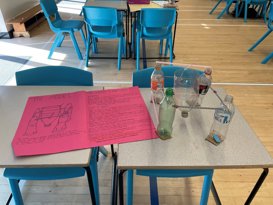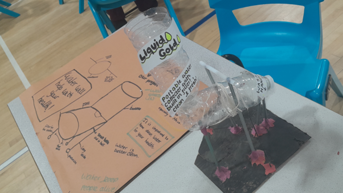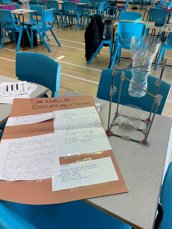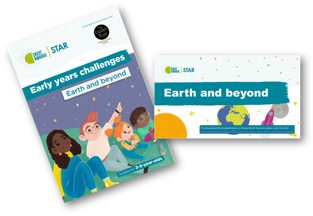Posted:
14 January 2025
Using Engage Grants to run CREST Discovery Days

“With science your outcome is often a grade, but with [CREST Awards] it’s something you’ve made.” Laura Taylor, Curriculum Leader of Science at Somercotes Academy, told us.
Laura was speaking to us from her classroom in Somercotes - a secondary school in rural Lincolnshire – about the CREST Discovery Days she has run with her Year 9 students for three consecutive years, and why they get so much out of it.
These days were made possible by the Engage Grant Somercotes received from the British Science Association (BSA). Each autumn and spring term we offer funding of £350 for materials etc. plus up to £350 worth of CREST Awards free for schools in challenging circumstances.
Laura spoke to us about why she chose to run CREST Discovery Awards, how she got the students involved and excited, why the Engage Grant made such a difference, and more.
Why run a CREST Discovery Day?
Somercotes was able to apply for an Engage Grant both because of its rural location and the high percentage of students eligible for pupil premium funding (a school must have at least 30% of students eligible for pupil premium or equivalent, or 30% of students from an ethnic minority background or a rural postcode to apply).
This, Laura told us, is what drew teachers at Somercotes to CREST – it gives students who may not have had the opportunity to have varied experiences with science, beyond curriculum-based lessons, the chance to see it in a new light.
“One of the reasons we looked at doing CREST, one is to build the profile of science [in the academy]…but secondly so they can experience things.”
She explained that schools trips out of their local area – often a chance for students to broaden perceptions of STEM* careers - would cost money that neither the school nor families may have to spare.
Running a CREST Discovery Day gives students an out-of-the-ordinary experience, and the chance to behave like real scientists and engineers. Discovery projects are done in teams, which each member having a different role, and take around five hours to complete.
Laura first ran Discovery in January 2022, just months after the final COVID-19 restrictions were lifted – which served as inspiration. The students took part in ‘Stop the spread’, (and have every year since) a project all about improving hygiene to reduce the spread of infectious diseases, a topic which could hardly be more relevant to the times.
It also appealed as it tied in closely with students’ curriculum work in biology on communicable diseases – it was a chance for them to see how this knowledge could be applied to a STEM career.
The Engage Grant was a big draw:
They get to do something that is recognised with the certificate which you get through your grant, which was obviously a bonus.
Watch the video below to hear from Laura about the benefits of running the CREST Discovery Day, including the increase in students opting for triple science at GSCE, more understanding about possible careers, and a boost in confidence and communication skills.
How to engage the students
Evoking enthusiasm in students is vital for the day to go with a bang, and Laura found ways to make it exciting and accessible to all.
The whole of Year 9 did the Discovery Day together, they were taken out of normal lessons to give the day a special air. Laura told us:
All the kids come off timetable and go in the hall… that’s how we deliver the Discovery Day, so we try and make it a very big thing.
While this can be fun and exciting, some students with SEND* may find being around so many others overwhelming – Laura made provisions for this:
We tend to find [students with SEND] don’t not want to do the activity, it’s the situation around it. So they can go into a little room, just another classroom, and they’ll take a TA with them in there and then they will go through the same procedures.
She continued:
I think it’s probably more accessible to them than some of the other science work due to the fact that it’s more hands-on.

The teamwork aspect of Discovery Days also helps to bring students who might not necessarily flourish in a normal classroom setting out of their shell, and help them to see the valuable skills they have to offer.
For example, Laura explained, some students might not excel in writing up the project, but they shine in the hands-on aspect of it, and so they’re a key member of the team.
Make it cross-curricular
STEM subjects can feel dry to students if they’re not shown the connection to the world and their lives; CREST projects are perfect for letting science break out of its box - linking it to other subjects on the curriculum and the world at large.
Laura’s Year 9 students in three consecutive years have taken part in ‘Stop the Spread’, for which students research sanitation in developing countries and issues around clean water scarcity. This has clear links with geography and, Laura told us, art came into play as they had to design posters to display their work.
Laura also ensured the project was linked to environmental issues and sustainability, explaining that they are reusing resources like paper and cardboard. The school has an eco-committee that oversees this type of recycle, reuse, reduce initiative.
We try as well to be very sustainable with it and highlight the importance because climate change will be around in geography, in science. If we use plastic it’s from plastic bottles the students bring in, and things like that. So it builds up sustainability and it’s all for CREST day.

Recommend the grant
Would you recommend applying for an Engage Grant to other teachers? we asked Laura:
Definitely, the funding is a big draw for us, getting the certificates…getting it recognised is a big thing, so definitely. Our kids thrive on that sort of thing…it’s just something out of the ordinary.


